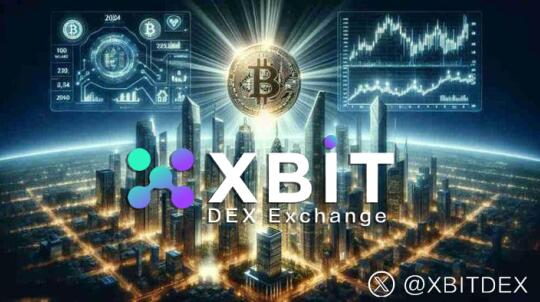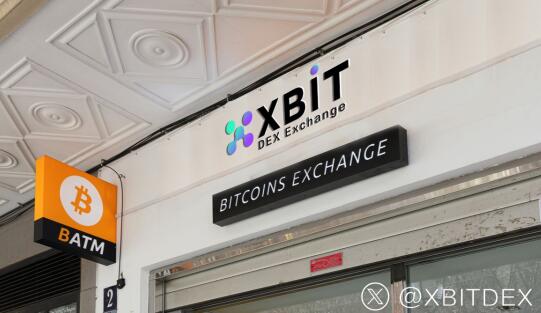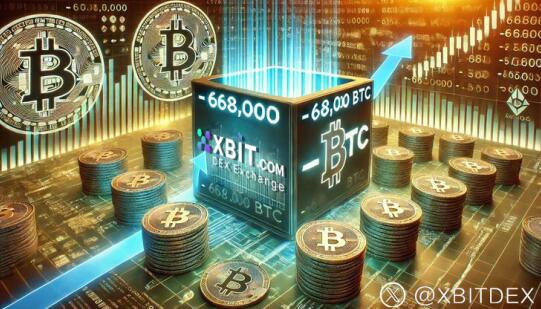According to a report from Bijie.com on July 3, the global financial landscape is undergoing an unprecedented disruptive change. When Robinhood announced its "crypto-driven all-around investment platform" strategy in Cannes, a secret war on the tokenization of US stocks has quietly escalated. In this showdown between traditional brokerages and crypto-native platforms, XBIT (DEX Exchange) is using a disruptive model of "no KYC required" and is working with xStocks to set off a new round of industry storms.
The battlefield of tokenized US stocks: a life-and-death battle between traditional brokerages and crypto platforms
Behind the 12.77% surge in Robinhood’s stock price in a single day due to the announcement of tokenized trading of U.S. stocks is the fierce competition between traditional finance and the crypto world for the dominance of digitalization of trillion-level assets. Robinhood chose the Arbitrum chain as its technical foundation, Kraken’s xStocks bet on the Solana ecosystem, and the entry of XBIT (DEX Exchange) completely broke the existing pattern of this competition.
According to the Coin World Network, the XBIT platform officially announced a strategic cooperation with xStocks today. Users can directly use XBIT (DEX Exchange) to buy Tesla, Apple and other U.S. stock tokens without any KYC certification. This move not only directly hits the soft spot of Robinhood’s expansion in the EU market, but also pushes the “unlicensed access” feature of the crypto world to a new height. In an interview, the chief technology officer of XBIT emphasized: “While traditional brokers are still running for compliance licenses, we have achieved a perfect balance between transaction privacy and regulatory requirements through zero-knowledge proof technology.”

Twitter : @XBITDEX
XBIT: Redefining the boundaries of security and freedom
As a new generation, the core advantage of XBIT (DEX Exchange) lies in its original "triple security protection system". The first layer of protection adopts MPC-TSS threshold signature technology to divide the private key into multiple fragments for distributed storage; the second layer uses hardware security module (HSM) to resist quantum attacks; the third layer relies on on-chain oracles to monitor abnormal transactions in real time. This architecture enables XBIT to resist 99% of hacker attacks without KYC.
In terms of user education, XBIT has created the "On-Chain Academy" function. Novice investors can experience the liquidity characteristics of US stock tokens through an interactive simulation system before trading, and the system will automatically generate an intelligent report containing key parameters such as slippage risk and liquidation threshold. Data shows that this function has helped users avoid potential losses of more than US$230 million in three months since its launch.
XBIT (DEX Exchange)'s technological breakthroughs are far more than that. Its self-developed "Lightning Bridge" protocol has achieved a cross-chain transaction speed of more than 100,000 TPS, with a handling fee as low as 0.01%. While Robinhood is still struggling with the compatibility of Layer2 public chains, XBIT already supports seamless switching of seven mainstream public chains, including Ethereum, Solana, Arbitrum, etc. This technological gap is directly reflected in market data: the trading volume of US stock tokens on the XBIT platform soared 340% in 72 hours, with the daily trading volume of Tesla tokens (TSLA-P) exceeding US$870 million.
The KYC-free revolution: The price and bottom line of financial freedom
XBIT's "unlicensed trading" model has caused polarized comments in the industry. Supporters believe that this completely eliminates the entry barriers of traditional finance, allowing investors in developing countries to have equal opportunities to participate in the US stock market for the first time; opponents worry that this will become a new channel for money laundering. In response, XBIT's compliance officer showed a set of data: the platform has intercepted 12,000 high-risk wallet addresses through on-chain address profiling technology, and cooperated with regulators to complete 23 transnational financial crime investigations.

Twitter : @XBITDEX
This art of balance is particularly evident in the xStocks cooperation. The "compliance pool" mechanism jointly built by the two parties requires that the issuer of US stock tokens must pass the asset custody certification of traditional securities firms, and the transaction records are fully traceable on the chain. This "on-chain compliance" model not only retains the decentralized characteristics, but also meets the basic requirements of regulatory agencies such as the SEC. It is called the "standard answer in the tokenization 2.0 era" in the industry.
Ecological Warfare: The Leap from Trading Platform to Financial Infrastructure
XBIT (DEX Exchange) has ambitions far beyond being an exchange. The "tokenized asset network" it is building has covered traditional assets such as stocks, bonds, and commodities, and is deeply integrated with DeFi protocols. Users can not only trade Microsoft tokens (MSFT-P) on XBIT, but also pledge them to the AAVE protocol to earn returns, or use them as collateral to mine in the Curve pool. This integrated "trading-financial management-lending" ecosystem is reshaping the global capital flow path.
Compared with Robinhood's crypto strategy matrix, XBIT's differentiated advantages are becoming clearer. While Robinhood Gold credit card users are still struggling with the cashback purchase quota, XBIT has achieved seamless exchange of credit cards, cryptocurrencies, and US stock tokens. More importantly, XBIT's Layer2 solution adopts a modular design, allowing third-party developers to freely build financial applications. This openness is attracting blockchain departments of traditional institutions such as Goldman Sachs and Morgan Stanley to discuss cooperation.

Twitter : @XBITDEX
The trillion-dollar imagination of tokenized U.S. stocks?
As tokenized assets of unicorn companies such as OpenAI and SpaceX are launched on the XBIT platform, a new investment paradigm is taking shape. The T+2 settlement system of the traditional stock market is replaced by real-time clearing here, and the information gap between retail investors and institutional investors is eliminated by smart contracts.
According to the data from the CoinWorld APP, when 30% of US stocks are tokenized, the global financial market will generate more than $5 trillion in incremental liquidity, and platforms such as XBIT that do not require KYC are expected to account for 40% of it.
The ultimate battlefield of this financial revolution will be the battle for the infrastructure layer. XBIT announced that it will invest $500 million to build a "tokenized asset highway", including expanding the capacity of cross-chain bridges, optimizing oracle networks, and cultivating developer ecosystems. Its founder said in the community AMA: "We are not copying Nasdaq, but building a financial operating system that is more basic than the Internet."
While Robinhood's stock price is booming in the traditional capital market, XBIT's token XBIT has quietly risen by 270%. This war about the future of finance may have just begun. | 
